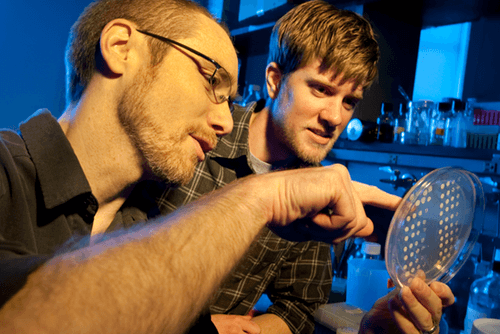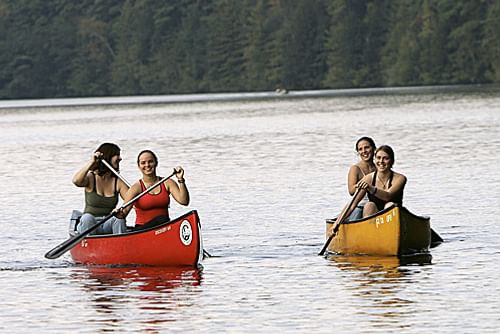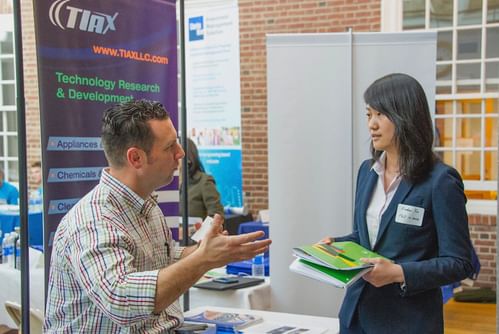- Undergraduate
Bachelor's Degrees
Bachelor of ArtsBachelor of EngineeringDual-Degree ProgramUndergraduate AdmissionsUndergraduate Experience
- Graduate
Graduate Experience
- Research
- Entrepreneurship
- Community
- About
-
Search
Bachelor's Degrees
The Dartmouth Difference
"Students are not admitted into engineering—they are admitted to Dartmouth. They come, they explore, they learn critical thinking skills. They can play sports, learn a language, or study abroad. You can be an engineer and still have access to the full Dartmouth experience."
—Professor Laura Ray
Two degrees? It's different, we know.
Dartmouth engineering sciences majors earn a Bachelor of Arts (AB) before the professional Bachelor of Engineering (BE) degree. Why?—because problems don't fall neatly into engineering disciplines or happen in a vacuum. Through Dartmouth's systems-based, interdisciplinary approach, you'll engage in project-based engineering while immersed in the liberal arts to help deepen your understanding of our world.
Most majors pursue both the AB and BE, taking additional coursework in specialized areas for the BE. Many complete both degrees in four years, while others opt for a fifth year. Need-based financial aid is available throughout your journey.
Human-centered by design.
Embedded in our engineering design curriculum is a human-centered culture and belief that our work should strive to make the world better for everyone. Our Design Initiative at Dartmouth (DIAD) builds interpersonal collaborations to bring more design tools and mindsets to all corners of campus. Learn how to assess for human factors and account for unintended consequences and community impact. You'll be a better engineer for it.
Hands-on from the start.
Your first engineering class—Introduction to Engineering (a.k.a. ENGS 21)—will challenge you to develop novel solutions to a real-life problem and team up to design, build, test, and iterate prototypes. You’ll research patents, create a business plan as if you were taking your product to market, and present your project to a professional review board. Project-based learning is infused throughout your entire Dartmouth experience.
Unparalleled access to ... everything.
From your professors to our machine shop, project spaces, and labs—and even funding for undergraduate research—you'll have unparalleled access to resources to enrich your learning. Choose your own faculty advisor. Patent an innovation. Engage in entrepreneurial pursuits. Study engineering abroad. Work with faculty across Dartmouth, Geisel School of Medicine, and Tuck School of Business. Contribute to graduate research... and more.
An engineer and ...
… an athlete, a musician, an artist, an entrepreneur, a humanitarian—you name it. Our students combine their passion for engineering with a wide range of other interests. And, that's how we like it.
Engineering at Dartmouth isn't just for engineers. Courses for non-majors provide all students a chance to experience engineering and gain skills useful for all areas of life.
Discover Dartmouth Engineering

Undergraduate Research
There are many ways engineering students can participate—and receive funding—for research, including taking part in the First-Year Research in Engineering program or the Women in Science Project.
Learn More
Study Abroad
Engineering students can pursue a variety of study abroad programs through Dartmouth's Guarini Institute for International Education. In addition, we offer four exchange programs designed especially for engineering majors.
Learn More
Student Life
Studying engineering will take time, but not ALL your time. Enjoy the benefits of our close-knit community, where you have unfettered access to the outdoors, art and culture, and more.

Life After Dartmouth
What can you do with a Dartmouth engineering degree? Anything you want! You will have access to engineering-focused a career services team and an extensive network of alumni and employers.
Learn MoreApplying to Dartmouth
All undergraduate students, with the exception of Partner School Dual-Degree students, must apply through Dartmouth's Office of Undergraduate Admissions. There is no direct application process to Thayer School of Engineering for high school or transfer students interested in earning the Bachelor of Arts (AB) or the Bachelor of Engineering (BE) at Dartmouth.
Financial Aid
Undergraduate Financial Aid
Students interested in pursuing the Bachelor of Arts (AB) (or the combined AB and BE within four years) apply for financial aid through Dartmouth's Office of Financial Aid. Dartmouth meets 100% of demonstrated financial need, with all aid in the form of scholarships, grants, and Federal Work Study.
Fifth-Year BE Students
Students who add a fifth year to allow for more time to earn the Bachelor of Engineering (BE) apply for financial aid to Thayer School of Engineering. Aid is available in the form of partial-tuition scholarships, hourly employment as teaching assistants or in other capacities, fellowships, and loans.
Visit Dartmouth Engineering
Register to attend a 30-minute Dartmouth Engineering undergraduate degree programs information session with a professor or senior staff member, followed by a 30-minute conversation or campus tour with a current student.
